Analysis and commentary on the Network’s experiences coordinating climate-resilient development.

Seven Guiding Principles for Preparing Financing Strategies for Climate Change Adaptation in Developing Countries
By Deborah Murphy, Senior Associate, NAP Global Network Secretariat (IISD) and Jo-Ellen Parry, Deputy Director, Resilience (IISD)
As developing countries transition from planning to implementation in their National Adaptation Plan (NAP) processes, a critical step is securing financing to implement priority adaptation actions articulated through the NAP process. Several developing countries are preparing “financing strategies for adaptation” to set out a coordinated national approach to identify investment priorities and financing approaches for […]
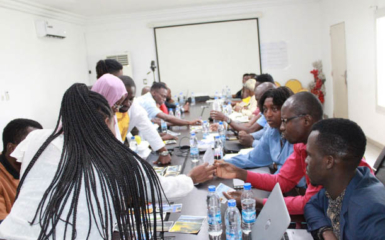
La Côte d’Ivoire lance une stratégie de communication pour le processus de PNA et une campagne en ligne pour impliquer les jeunes dans l’adaptation au changement climatique
Alors que le ministère de l'Environnement, du Développement Durable et de la Transition Écologique (MINEDDTE) prépare son premier document de plan national d’adaptation (PNA), il a lancé une campagne en ligne appelant les jeunes à s'impliquer dans l'adaptation.
La Côte d’Ivoire se prépare actuellement à lancer son premier document de PNA, qui devrait être validé par le ministre dans le mois à venir.

Côte d’Ivoire Launches NAP Communication Strategy and Digital Campaign to Engage Youth in Climate Change Adaptation
As the Ministry of Environment, Sustainable Development and Ecological Transition (MINEDDTE) prepares its first national adaptation plan (NAP) document, it launched a digital campaign calling on youth to get involved in adaptation.
Côte d’Ivoire is currently preparing to launch its first national NAP document, which is expected to be validated by the minister in the coming month.

Des représentant·es des ministères de l’environnement du Sénégal et de la Centrafrique se sont rendus en Côte d’Ivoire pour échanger sur l’intégration du genre dans le processus de PNA
By Aurélie Ceinos
Quatre délégué·es du Sénégal et de la Centrafrique ont pu rencontrer, entre les 19 et 22 décembre, plus d’une trentaine d’acteurs genre et climat de la Côte d’Ivoire pour échanger sur leurs difficultés et leurs succès en matière d’intégration du genre dans le processus de plan national d’adaptation (PNA). Ils repartent motivés et avec de […]
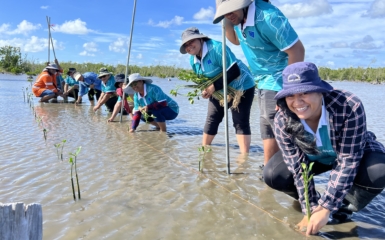
Sustaining Hope and Harvesting Rainwater
By Viliami Takau, JNAP Secretariat, Ministry of Meteorology, Energy, Information, Disaster Management, Environment, Climate Change and Communications (MEIDECC), Government of Tonga
This photo essay shares stories of how Tonga’s national adaptation plan is being implemented.

How to Integrate Learning Into Climate Adaptation Policy Processes
Julie Dekens (IISD), Blane Harvey (McGill University), Andrea K. Gerlak (University of Arizona), and Tanya Heikkila (University of Colorado Denver)
View Report The effectiveness of climate change adaptation decision making largely depends on how well governments and other actors embed deliberate learning into the policy process. Indeed, research shows that learning does not happen automatically—it needs to be created and nurtured. In the new report Integrating Learning in the National Adaptation Plan Process, Julie Dekens […]

Peer Learning Forum: Transitioning from Planning to Implementation in the National Adaptation Plan (NAP) Process
Victoria Falls, Zimbabwe | February 27-29, 2024
Experts and government representatives from 15 countries—Antigua and Barbuda, Armenia, Bhutan, Cambodia, Colombia, Ethiopia, Grenada, Kenya, Lesotho, Liberia, Namibia, Paraguay, Saint Lucia, Timor Leste, and Zambia—convened in Victoria Falls, Zimbabwe, to share lessons and experiences on the transition from planning to implementation in the national adaptation plan (NAP) process. Co-hosted by the NAP Global Network […]
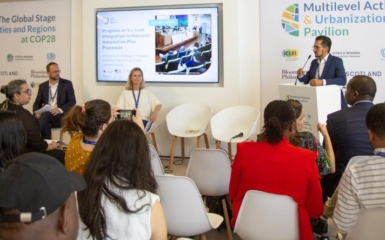
COP 28 | Sub-national Governments’ Leadership in Driving NAP and NDC Implementation
This event highlighted the significance of and need for clear recognition of subnational governments’ contributions to climate change adaptation action,
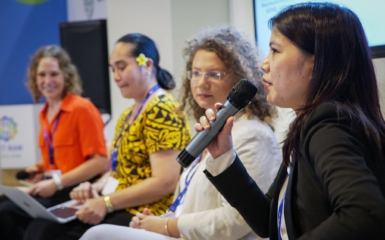
COP 28 | Using Progress Reporting to Advance Your NAP
How countries track and assess progress
This event at COP 28, hosted by the NAP Global Network, explored various approaches to NAP implementation, assessment, and reporting by Vietnam, Tonga, Albania and the UK. Speakers shared diverse approaches and lessons learnt in progress reporting.

Assessment of Progress: To what extent have NAP processes contributed to the Global Goal on Adaptation?
At the UN Bonn Climate Change Conference (SB60) in June 2024, countries will initiate the assessment of the progress in formulating and implementing their NAPs.
At the 2024 UN Bonn Climate Change Conference, countries will initiate the assessment of the progress in the formulating and implementing their NAPs.

NAP Global Network at COP 28
Dubai, United Arab Emirates | November 30–December 12, 2023
The NAP Global Network Secretariat team will be at COP 28 in Dubai to connect with our country partners, exploring insights and lessons on NAP processes, engaging in discussions around the GST and the GGA, and tracking what adaptation-related negotiations will mean for NAP processes in years to come.
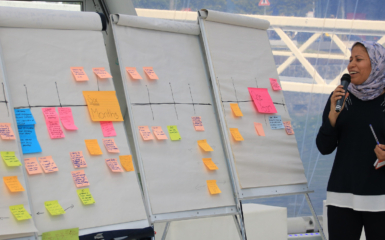
Are We Adapting? 10 lessons from countries tracking progress on their climate change adaptation efforts
By Patrick Guerdat, Policy Advisor, NAP Global Network, International Institute for Sustainable Development
How do we know if National Adaptation Plans (NAP) are making a dent in reducing vulnerability? NAP progress reports play a critical role in assessing a country’s climate change preparedness and advising on next steps. They consolidate the information gathered from monitoring, evaluation, and learning (MEL) activities and encourage countries to continuously learn, adapt, and improve on their climate change adaptation efforts.